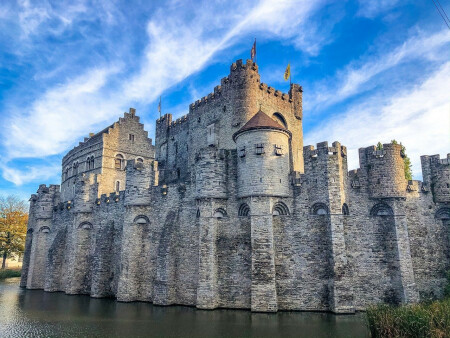User report: from hetarchief.be to master’s thesis
2 Dec 2021We often come across people using hetarchief.be for work on fascinating stories or research. This month we want to tell you about Gitte Derluyn, a student at Ghent University. She’s working hard on her master’s thesis, for which she’s delving into the recent history of Gravensteen Castle in Ghent. Thanks to hetarchief.be, she’s discovered a wealth of audiovisual content and various helpful content partners.
The Archive reaches out to new users
Earlier this year, we encouraged Flemish researchers and teachers in higher education to explore hetarchief.be and share it with their students, which is how the digital database appeared on Gitte Derluyn’s radar and set the ball rolling. It enabled her to target her searches through the archives of over 100 partner organisations – making it much easier to find specific sources and archive content. An added bonus is that everything is done digitally on hetarchief.be (link in Dutch), which is particularly useful during a pandemic.
To the source
‘I didn’t want to go too far back in the castle’s history, and focussed mainly on the last 100 years,’ explains Gitte. This starting point just before the First World War means there are lots of different archives and sources that could be useful. ‘My first valuable resource was Ghent University’s own archive, which has lots of collections with content about the student occupation in 1949, for example.’
Gitte mainly wanted to explore evolutions in how the castle has been used, and how people’s thoughts about it might have changed, so she needed a wide range of sources. Audiovisual content proved to be a major asset. ‘It was my promoter Berber Bevernage who first told me about hetarchief.be,’ says Gitte, ‘where I could search through all sorts of organisations’ digital archives straight away – from Liberas and Amsab Institute for Social History to the VRT archives.’

Photo: Gravensteen, © Pixabay
The added value of audiovisual sources
At hetarchief.be (link in Dutch), Gitte can search through descriptions of image content and request clips. ‘VRT soon noticed that I was asking for lots of clips around the same subject on hetarchief.be and invited me for a video call,’ explains Gitte. ‘And they’ve continued to provide help and useful source materials ever since.’
Audiovisual content is an interesting addition to the classic written sources for Gitte’s research. ‘The main advantage of hetarchief.be is that it brings so many different archives together and everything is searchable.’ This means Gitte doesn’t have to wade through all the archives one by one to find useful content. ‘I can do lots of my searching from home and prepare for my visits to the archive better, so it makes my work much easier. I’ve already let several fellow students know about hetarchief.be.’
Initial insights and connections
Gitte is still busy working on her research phase, so it’s much too early for any conclusions, but the audiovisual materials have already helped her to spot some interesting trends and insights: ‘It turns out that searching for a balance between contemporary and old elements in the castle is not a new phenomenon,’ explains Gitte. ‘There were lots of discussions in the early 1990s about adding a modern stairway, for example, and talks started about a new reception pavilion as early as 2004.’
Another thing that’s striking is the shift in public opinion on restoration and renovation. Much of the local population initially cared little for restoration work at the start of the 20th century, but you can see this changing now. The focus is often on any protests these days, but many of the earlier interventions were actually well received. ‘Restoration works have barely been questioned over the years – they were deemed necessary to prevent decay and to preserve the building.’ The audiovisual content that Gitte has discovered at hetarchief.be (link in Dutch) helps her follow the tone of this debate much better.
Are you using hetarchief.be for your thesis or research project?
Every day, new fragments are added to hetarchief.be. You might also find hidden treasures? Or discover sheer nostalgia? See for yourself and share your finds and discoveries with our team via jouwverhaal@hetarchief.be.
Want to read more reports? Discover Reinier’s report on Sherlock Holmes.
